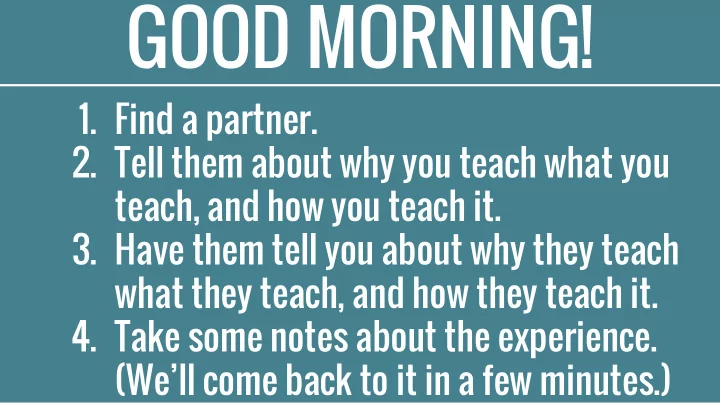

GOOD MORNING! 1. Find a partner. 2. Tell them about why you teach what you teach, and how you teach it. 3. Have them tell you about why they teach what they teach, and how they teach it. 4. Take some notes about the experience. (We’ll come back to it in a few minutes.)
MY LENS, MYSELF. Jessica Critten University of West Georgia @JessicaCritten A Hermeneutics of Kevin Seeber University of Colorado Denver Information Literacy. @KevinSeeber California Conference on Library Instruction. #ccli2016 University of San Francisco. April 29, 2016.
Theory.
THEORY VS. PRACTICE
Hey. Let’s talk. How do we all feel about theory ? How does the profession react to theoretical discussions?
Some really smart people have been discussing theory.
“The political championing of clarity and the attendant devaluation of theory … turns on a politics of common sense. The call to use plain language, like calls to be practical, assumes that shared conceptual frameworks can adequately furnish attempts to challenge domination, and thus assumes that such frameworks are politically neutral; that the languages and concepts we’ve come to understand as ordinary and unremarkable are not part of the machinery of domination themselves.” (Hudson, 2016, 21:45)
“When we call for more value for lived experience and ‘practicality’ or ‘plain language,’ what we’re really calling for is more value for the theoretical work coming from the margins.” (Hathcock, 2016)
“When our lived experience of theorizing is fundamentally linked to processes of self- discovery, of collective liberation, no gap exists between theory and practice. Indeed, what such experience makes evident is the bond between the two--that ultimately reciprocal process wherein one enables the other.” (hooks, 1991, p. 61)
So … why do you Your work, teach what you your practice. teach, and how do you teach it?
Why do you think that?
Yeah, but why do you think THAT?
Yeah, but REALLY why do you think THAT?
(This process can go on for a long, long time.)
You’ll reach a point where you can’t Your theory, articulate what you feel. You might not your lens. have the words, but you hold it very deeply.
“Uncovering the particularity and contingency of our knowledge and practices is at the core of whatever generative advances we might make regarding our purposes and practices.” (Lather, 1991, p. 14)
Why do we teach what we teach, and how do we teach it?
We didn’t set out to change course. Instead, we were “brought up short.”
SMALL GROUP DISCUSSION With the people around you, discuss that core feeling you had. What changed once you dug deeper? What did you realize about what you thought/felt and why you thought/felt that way?
FULL GROUP DISCUSSION How did someone else’s feeling change your perception? How do your feelings inform the work you do, and how you do it?
“Theory vs. Practice” is a false dichotomy. All of us reflect on our beliefs to inform our work constantly. The two are inseparable.
Praxis.
Did you really just say “ hermeneutics”...?
Hermeneutics Theory of interpretation, or understanding
How does hermeneutics work?
PREJUDICE
FUSION OF HORIZONS
What does a hermeneutics of information literacy look like?
A hermeneutics of information literacy
Step one: Choose a topic
Step one: Choose a topic
Information literacy is personal.
Information literacy is political.
“Read more, Jessica”
We can’t always measure student learning. And we need to get right with that.
“The future is dark, which is the best thing the future can be, I think.” (Virginia Woolf)
Looking at our work with a new lens.
Questions? Kevin Seeber kevin.seeber@ucdenver.com/@kevinseeber Jessica Critten jcritten@westga.edu/@jessicacritten
Bibliography/Image Credits Dickson W. “Boxing Cats: A Dickson Movie” Image retrieved from: https://commons.wikimedia.org/wiki/File:Boxing_Cats_Dickson.jpg Gadamer, H.G. (1982). Hermeneutics as a practical philosophy. Reason in the age of science. Cambridge, Mass.: MIT Press. Hathcock, A. (2016, March 2). Decolonizing social justice work. [Web log post] Retrieved from: https://aprilhathcock.wordpress.com/2016/03/02/decolonizing- social- justice-work/ Hitchcock, A. (Producer & Director). (1958). Vertigo . United States: Paramount Pictures. hooks, b. (1994). Teaching to transgress: Education as the practice of freedom . New York: Routledge. Hudson, D. (2016, February 25). On critical librarianship and pedagogies of the practical. Keynote presented at the Critical Librarianship and Pedagogy Symposium, Tucson, Arizona. Retrieved from: https://arizona.hosted.panopto.com/Panopto/Pages/Viewer.aspx?id=38721a22-ed66-4904-bd93-f2953353e7ee Iceberg: Photoshop power by Pere. Creative Commons Attribution-NonCommercial-ShareAlike 2.0 Generic license: https://www.flickr. com/photos/pere/523019984 Lather, P. (1991). Getting smart: Feminist research and pedagogy with/in the postmodern. New York: Routledge. Solnit, R. (2014). “Woolf’s darkness: Embracing the Inexplicable.” Men explain things to me. Chicago: Haymarket Books. Woolf, V. (1977). The diary of Virginia Woolf (1st American ed.). New York: Harcourt Brace Jovanovich.
Recommend
More recommend